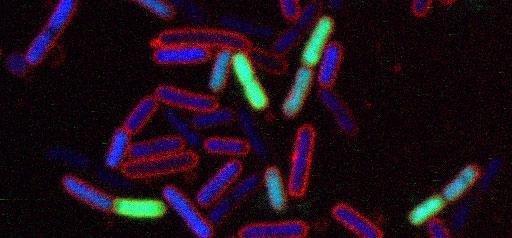Development of a novel class of antibiotics

The new substance class co-developed by NRP 72 researchers is particularly effective against the currently most dangerous antibiotic-resistant pathogens.
Escherichia coli cells treated with a novel chimeric peptidomimetic antibiotic. Cells in blue are alive while green cells are already killed by the peptidomimetic. | Image: Matthias Urfer
A number of pathogens protect themselves with an outer membrane that makes it difficult to combat them with antibiotics. In addition, the widespread use of antibiotics promotes the development of resistant bacteria. Sebastian Hiller from the Biozentrum of the University of Basel has now discovered a new class of antibiotics that have a completely different effect from previous antibiotics as part of an NRP 72 project, in collaboration with Polyphor AG and scientists from ETH Zurich and the University of Zurich.
With this newly developed drug class, specifically infections by Gram-negative bacteria can be treated. This group of bacteria are a common cause of serious and often life-threatening infections, including pneumonia, urinary tract infections, sepsis as well as cholera or typhoid fever.
New antibiotic class targets bacterial membrane components
This new class of antibiotics known as OMPTA (Outer Membrane Protein Targeting Antibiotics) targets two important components in the outer membrane of Gram-negative bacteria: specific membrane proteins, in particular BamA, and lipopolysaccharides. This disturbs the integrity of the outer membrane and thus vital processes such as the transport of substances or signal transmission.
Hiller's team has provided important information, in particular on the mode of action of the new antibiotic compound. “Using high-resolution NMR spectroscopy, we could localize the binding site of the OMPTA compound on the outer membrane protein BamA,” says Hiller “We have also been able to demonstrate that binding of the compound shifts the protein BamA into its closed, inactive state.” The interaction can thus block the integration of newly produced membrane proteins into the outer bacterial cell envelope.
Fighting difficult-to-treat infections
Antibiotics of this new class have the potential to successfully fight difficult-to-treat infections, even if the pathogens are already resistant or multi-resistant to conventional antibiotics. This discovery potentially constitutes a major breakthrough in the fight against antibiotic-resistance, which is a global threat for society and healthcare systems.
First drug candidate in preclinical trial
Polyphor further announced that the lead molecule of this new OMPTA class is currently in preclinical development. Polyphor is an Allschwil-based biopharmaceutical company focused on the discovery and development of immuno-oncology compounds and a new class of antibiotics.
- Interview Prof. Sebastian Hiller
- Project: "The molecular mechanism of outer membrane protein insertion by BamA and its role as a target for new antibiotics"
Literature: Anatol Luther et. al. Chimeric Peptidomimetic Antibiotics Against Gram-Negative Bacteria. Nature. 23 October 2019. DOI: 10.1038/s41586-019-1665-6
